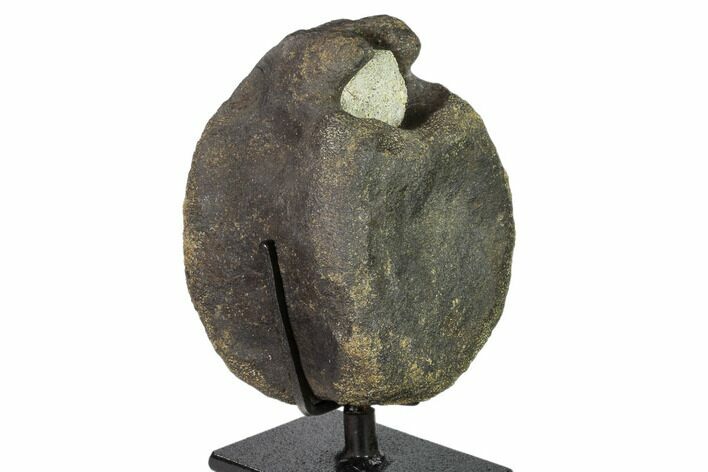4.3" Hadrosaur (Hypacrosaur) Caudal Vertebra with Stand - Montana
This is a nicely preserved, 4.3" tall Hadrosaur (Hypacrosaurus sp.) caudal vertebra from the Two Medicine Formation of Montana. It was collected this last spring and has been nicely prepared from the hard rock surrounding it.
This gorgeous vertebra has some weathering along the edges of the centrum. The right (anatomical) side of the vertebral canal required crack repair and minor gap fill restoration. The hard rock has been left within the vertebral canal for structural integrity.
Comes with the pictured custom metal display stand.
This gorgeous vertebra has some weathering along the edges of the centrum. The right (anatomical) side of the vertebral canal required crack repair and minor gap fill restoration. The hard rock has been left within the vertebral canal for structural integrity.
Comes with the pictured custom metal display stand.
About Hypacrosaurus
Hypacrosaurus is a very large, Lambeosaurini Hadrsosaur that would have been almost as large as the Tyrannosaurs that it lived alongside. Like Corythosaurus, it had a tall, hollow, rounded crest, although not as large and straight. It is known from the remains of two species that spanned 75 to 67 million years ago in the Late Cretaceous of Alberta, Canada, and Montana, United States, and is the latest hollow-crested duckbill known from good remains in North America. It is estimated to have been around 9.1 meters (30 feet) long and to have weighed up to 4-5 tons.
Hypacrosaurus is a very large, Lambeosaurini Hadrsosaur that would have been almost as large as the Tyrannosaurs that it lived alongside. Like Corythosaurus, it had a tall, hollow, rounded crest, although not as large and straight. It is known from the remains of two species that spanned 75 to 67 million years ago in the Late Cretaceous of Alberta, Canada, and Montana, United States, and is the latest hollow-crested duckbill known from good remains in North America. It is estimated to have been around 9.1 meters (30 feet) long and to have weighed up to 4-5 tons.
About The Two Medicine Formation
The Two Medicine Formation is a geographical formation in Central Montana and Southern Alberta, Canada. The formation is predominantly sandstone laid down by rivers and deltas during the Campanian Age of the Cretaceous, about 80-75 million years ago. Approximately two thousand feet thick on the western edge, it lies on top of the Virgelle Sandstone formation and under the Bearpaw Shale. It is located between the Front Range of the Rocky Mountains and the Sweetgrass Arch, a tectonic fold feature 40-90 miles east of the Front Range.
The Two Medicine is the same age as the Judith River Formation found further east. It was laid down further inland from the Western Interior Seaway, while the Judith River Formation was deposited along the coast. The Two Medicine contains much of the same dinosaur fauna, but fewer reptiles, amphibians, and aquatic fossils.
The Two Medicine Formation is a geographical formation in Central Montana and Southern Alberta, Canada. The formation is predominantly sandstone laid down by rivers and deltas during the Campanian Age of the Cretaceous, about 80-75 million years ago. Approximately two thousand feet thick on the western edge, it lies on top of the Virgelle Sandstone formation and under the Bearpaw Shale. It is located between the Front Range of the Rocky Mountains and the Sweetgrass Arch, a tectonic fold feature 40-90 miles east of the Front Range.
The Two Medicine is the same age as the Judith River Formation found further east. It was laid down further inland from the Western Interior Seaway, while the Judith River Formation was deposited along the coast. The Two Medicine contains much of the same dinosaur fauna, but fewer reptiles, amphibians, and aquatic fossils.
$595
SPECIES
Hypacrosaurus sp.
LOCATION
Pondera County, Montana
FORMATION
Two Medicine Formation
SIZE
4.3 x 3", 5.4" tall on stand
CATEGORY
SUB CATEGORY
ITEM
#159674
We guarantee the authenticity of all of our specimens.
 Reviews
Reviews
















